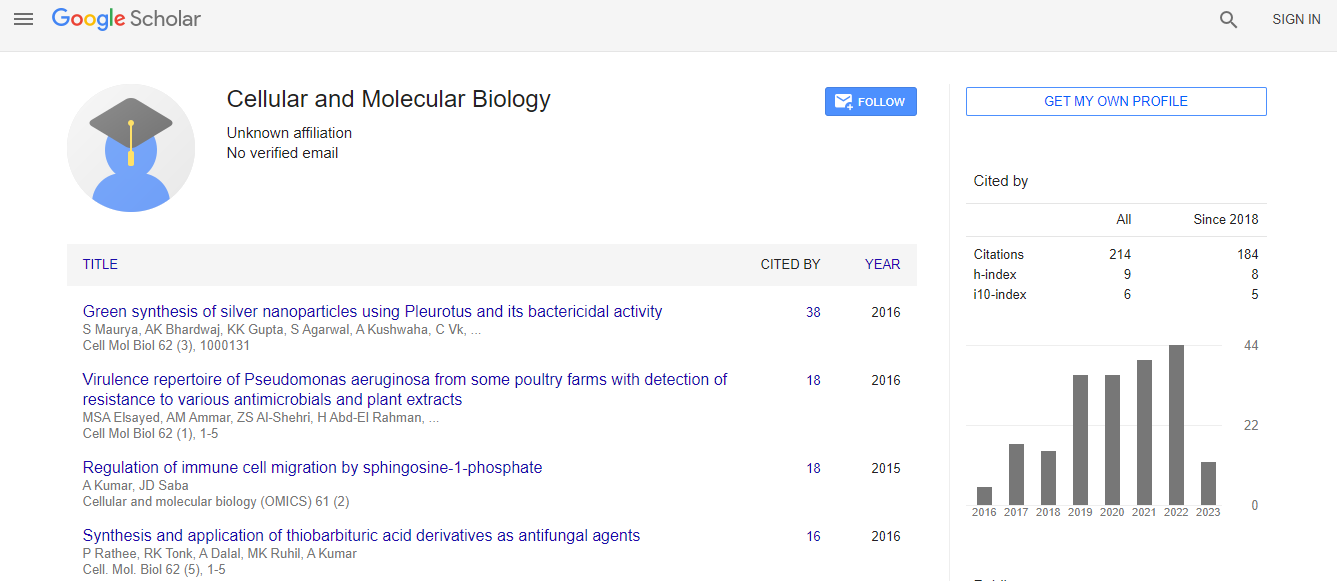Research Article
Production of Secondary Metabolites from Two Penicillium Strains Adapted to Different Temperature Conditions: A Study on Differential Response of Fungal Strains to Temperature Stress
Abstract
In the present investigation, temperature dependent production of secondary metabolites of two Penicillium strains i.e., cold tolerant Penicillium oxalicum originally isolated from a low temperature environment of Leh (Ladakh), India and the other one is mesophilic Penicillium citrinum (KR150257) isolated from Lucknow (Uttar Pradesh), India. The psychrotolerant P. oxalicum can grow at low temperature (4°C) and shows optimum growth at 15°C, while the mesophilic P. citrinum exhibits optimum growth temperature at 35°C. The study of secondary metabolites produced by both Penicillium strains, studied by UV-Visible Spectroscopy, GC-MS, confirmed the presence of alkaloids, mycotoxins, antibiotics, hydrocarbons and fatty acids. The maximum production of alkaloids by cold tolerant Penicillium oxalicum is detected under temperature stress (35°C). On the other hand, mesophilic Penicillium citrinum produced maximum alkaloids with different absorption characteristics at 35°C. The GC-MS analysis of secondary metabolites revealed the presence of number of unique biochemical compounds in both the P. oxalicum and P. citrinum strains grown under temperature stress conditions (35°C and 4°C, respectively). The common biochemical in the secondary metabolites produced by both the Penicillium strains grown under temperature stress condition are 3-dodecene, 2-dodecanol and 1-hexadecanol, eicosane, dibutyl, phthalate, 9-hexacosene, propanoic acid, 2-(aminooxy). The three-unique biochemical produced by P. oxalicum grown at low temperature (4°C) are 4(1H) Quinazolinone, 1,4,8-Metheno-1H-cyclopent [f] azulene, 3a, 4, 4a, 7, 7a, 8, 9, 9a-octahydro and 6-Quinazolinol. The five-unique biochemical produced by P. oxalicum at high temperature (35°C) are 2-Methyl-2-propylmethylphospho nofluoridate, Pyridine, 2[(1,1dimethylethyl) thio, 4(1H) Pyrimidinone,6-amino-2-methyl-5-nitroso, 4(3H) Quinolinone and Phthalic acid, di(2-propylpentyl). The seven unique biochemical produced by P. citrinum at low temperature (4°C) are Cyclohexanone, 4-ethyl-4-methyl-3-(1-methylethyl)-,trans-, 3-Methyl-1,4diazabicyclo[4.3.0]nonan-2,5- dione, N-acetyl, Glycyl-L-proline, Pyrrolo [1,2-a]pyrazine-1,4-dione,hexahydro-3-(2-methylpropyl)-, 2,2-Dimethylpropyl 2,2-dimethyl-propanesulfinyl sulfone, 11,14-Eicosadienoic acid, methyl ester. The unique derivative of β-lactam antibiotic produced by the P. citrinum at 35°C is 2,4-Azetidinedione,3,3-diethyl-1-methyl.

 Spanish
Spanish  Chinese
Chinese  Russian
Russian  German
German  French
French  Japanese
Japanese  Portuguese
Portuguese  Hindi
Hindi 
